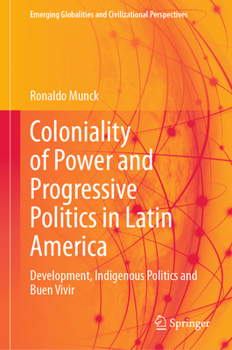Coloniality of Power and Progressive Politics in Latin America: Development, Indigenous Politics and Buen Vivir
"A very timely book that offers a sharp, agile, and clear tour through some of the concepts-horizons in which critical thinking and Latin American social movements converge, emphasizing the tensions, richness, and scope of Buen Vivir."
-- Maristella Svampa, National University of La Plata, Argentina. and recipient of the Konex Platinum Award in 2016
"... In his new book, Ronaldo Munck addresses traditional issues in a new light and reflects on how we can tip the scales towards 'a new dawn.' Inspiring "
-- Ana Cecilia Dinerstein, Professor of Political Sociology and Critical Theory, University of Bath, UK
"Ronaldo Munck discusses a cornucopia of ideas for shaping a progressive alternative world after globalization. ... An engaging and student friendly text given the clarity of its exposition."
-- Crist bal Kay, Emeritus Professor, International Institute of Social Studies, The Hague, Netherlands
" This book] offers a compelling heterodox political analysis of the complex turns to the left in Latin America over the last two decades. The book captures both the complexity and the possibilities of alternative projects in Latin America. ... Ronaldo Munck shows the enduring importance of Latin American thinking in our struggles to '(re) imagine a new future, a new dawn'."
-- Mo Hume, Professor of Latin American Studies, University of Glasgow, UK
"For those of us who thought we knew enough about globalization and Latin America, Ronaldo Munck's wide-ranging new book will be a real eye-opener and a critical source on radical Latin American scholarship over recent decades."
-- Leslie Sklair, Emeritus Professor of Sociology, London School of Economics, UK
" This book] represents an imaginative and rigorous effort to problematize Buen Vivir as concept, contribution, myth, and emancipatory horizon but, above all, as a path to take us beyond neoliberalism. ... Ronaldo Munck puts forward a radical reading of Buen Vivir, situating it in the long trajectory of critical thinking in Latin America. This is a fundamental book for understanding the theoretical, epistemic, and political possibility of a new Amerindia... "
-- Alejandra Santillana Ortiz, Director and Senior Researcher, Institute of Ecuadorian Studies, Quito, Ecuador
This book makes the powerful argument that Latin America needs to be a more central part of the discourse on emerging globalities and in the pursuit of an inter-civilizational focus to avoid West-centric perspectives. It deploys a cultural political economy approach that sees the global political economy as inescapably cultural and allows us to avoid the hyper-rational analysis of economics. It explores various aspects of contemporary Latin America from the revival of dependency theory, the 'pink tide' governments since 2000 and, in particular, the potential of the Andean Buen Vivir political philosophy, to offer a distinctive paradigm for sustainable global development.
The book provides a de-colonial frame and shows how many recent and new social science perspectives emerging globally are connected with Latin American scholars and Latin American social experiments: namely, dependency, decolonial and post-colonial epistemologies, post-neoliberalism, and the notion of Pluriverse. The book focuses on the cultural, the ethical, the economic and the political, and environmental dimensions of this transformation, which represents a reaction and alternative to the Western cultural, including ethical, economic, political, environmental crises.
The readership for this book includes all who are fascinated by the globalization lens on the one hand, and the experience and lessons of Latin America on the other hand.
Related Subjects
Philosophy Political Science Politics & Social Sciences Social Science Social Sciences




